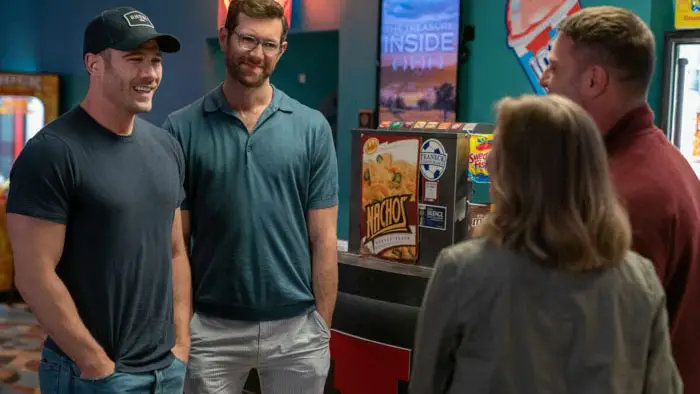
Now what Bobby accuses Bohemian Rhapsody of doing is something the community does too often. A classic example is how the films Brokeback Mountain and Call Me By Your Name are treated as “gay classics.” First of all, it’s not even been twenty years since either came out, so maybe hold off on calling them classics. But more importantly, they may depict homosexual relationships, but you know what else they depict? The same people in happy heterosexual relationships! The leads in both movies are all bisexual!!! With the long history of bi-erasure, it is difficult to accept that the curator of the first-ever LGBTQ+ history museum, even in a fictional context, is blatantly gatekeeping bi men as gay icons. Bros contains important trivia about queer history, but it made me want to walk up to Bobby and give him a history lesson. He probably thinks David Bowie was a cis gay man too! The cishet community is problematic enough. Now I have to worry about the cis gay one too? I’m aware that gay erasure is a real thing. A classic example would be the removal of lesbian insinuations from Emily Dickinson’s poetry. But the perpetrator was the cishet community. So we need to point fingers at that and, moreover, not just at people in particular, but at cis-heteronormativity! The day we don’t have a definition of “normal” is the day we no longer have to defend ourselves from erasure because assumptions will no longer be made.

“…it made me want to walk up to Bobby and give him a history lesson.”
Now, Bobby may be problematic, and Aaron too, even though his issue is more internalized, but Bros succeeds in its mission. And that is because it doesn’t reward their behavior. Aaron’s wish to have Bobby “tone it down” has negative repercussions for him. Bobby leaves him because he will not tolerate that. The museum committee abandons Bobby because of his blatant refusal to be open-minded. Bros makes the statement that no matter what your damage, you do not have the right to contribute to someone else’s suffering. And Bobby has his fair share of good ideals. He believes in telling stories about gay icons to kids and educating them about queerness from a young age. He is passionate about that and speaks quite eloquently. But that behavior disappears when he’s in the safe space provided to him by the queer committee in the museum. And the moment he takes it for granted, they leave him behind. There’s an important conversation about anger in Bros surrounding that situation. All the members of the committee admit that they’re angry, but they need to point fingers where the real blame lies and not at each other! Robert admits that he’s not yet in a headspace to forgive Bobby, and neither was I, as a viewer. But in Robert’s words, “I insist on progress, not just for our LGBTQ heroes, but for our LGBTQ a**holes.”
So through the flawed characters in Bros, screenwriter Billy Eichner, hopefully intentionally, addresses the issues of biphobia within the LGBTQIA+ community and internalized homophobia in gay men. Apart from being a cute romcom with history lessons, Bros is thus also an important viewing for queer individuals struggling with their identity and their place in the community.
Atreyo Palit is a queer film enthusiast looking to make a career in the film industry as a writer and journalist. He has an affinity for LGBTQIA+ and feminist cinema and loves analyzing complex human realities presented in films with a particular focus on representation.
